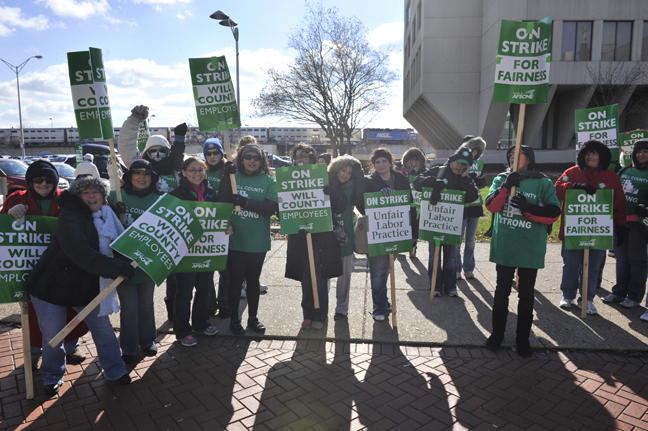
Photo by Pat Barcas
About 1,000 AFSCME workers walked off the job at municipal locations all across Will county Nov. 18. It was after not receiving a favorable contract in the past 15 months of talks.
By Pat Barcas
Staff Writer
pat@foxvalleylabornews.com.
Thursday, Nov. 21, 2013
JOLIET — American Federation of State, County and Municipal Employees (AFSCME) Local 1028 members have not received a favorable contract in the past 15 months of talks for Will County workers and Monday, Nov. 18, the union flexed its muscle, sending about 1,000 workers walking off the job at municipal locations all across the county.
Members staked out corners outside the Will County Courthouse in Joliet, as well as about 20 other locations in a rotating show of force. The courthouse had a message posted on its website saying service will be affected by the strike: “Phone calls will not be answered and e-mail responses may be delayed during this time.”
“What the county wants in their latest contract — if we agree to that, we’d be taking home less money. Most of us out here make less than $30,000 per year. That’s $13 per hour,” said Amanda Monczyski, who handles customer service in the courtroom.
She was picketing in front of the courthouse early Monday with dozens of other Local 1028 members.
Will County felony clerk Danielle Flores said it was her first time on strike, walking the picket line.
“It feels good to be out here, everyone is standing together,” she said.
Flores said many county workers barely make enough to feed their families, working several jobs and seeking out state assistance to supplement their income.
“It’s said the county wants its workers to receive state aid instead of paying them a decent wage,” she said.
According to a statement released by AFSCME, Will County management is trying to force employees to pay sharply higher costs for health insurance — twice what they now pay, with the lowest-paid employees saddled with the largest percentage hikes under the county’s plan.
“Everyone assumes when you work for the county you make good money. You don’t. The benefits were great, they aren’t so great anymore,” said Monczyski.
Those rising health care costs are unaffordable for county employees, 40 percent of who earn less than $30,000 per year. The employees also previously agreed to help the county through tough times by foregoing any cost-of-living pay increase for the past four years, something Will County Executive Larry Walsh disputes.
A statement put out by Walsh claims workers have continued to receive 2.5 percent wage step increases in each of those last four years.
The statement said the proposal the county leaders presented to Local 1028 insures “all AFSCME-represented employees receive wage increases more than offset any increase in health insurance premiums the employees will be asked to pay.”
“The first casualty of many political campaigns and union negotiations, is the truth,” said Walsh in the statement.
The county, however, has refused to add any amount to its cost-of-living proposal for nearly a month.
“Our union did everything possible to avoid this strike, but county politicians have failed to meet us halfway,” said AFSCME Local 1028 President Dave Delrose.
“Striking is tough for us personally and will disrupt the services we provide, but there comes a time when everyone has to stand up for what’s right. We ask the public’s continued support.”
The union represents more than 1,200 employees in the county court system, health department, highway department, Sunny Hill Nursing Home, county jail and in the offices of the sheriff, coroner, assessor, recorder, clerk, chief judge, circuit clerk, executive and state’s attorney.
Exempt from the strike are correctional officers, who are barred from striking by law and 911 emergency dispatchers, who are not allowed to strike due to a decision by a Will County judge deeming them too essential.
“This has never been an issue about money,” said Flores. “If the 911 operators are important enough to work, then they are damn well important enough to pay a living wage.”
